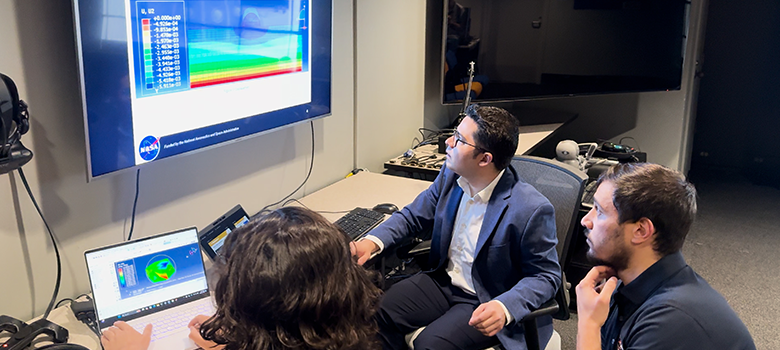
JANUARY 13, 2025 — As space missions beyond Earth become more ambitious, NASA needs to develop new ways to keep habitats operational when they are not occupied by astronauts.
UTSA Civil and Mechanical Engineering Professor Arturo Montoya and his students are laying the foundation for a future in space as part of a NASA-funded project that began in 2019. The Resilient Extraterrestrial Habitat Institute (RETHi) focuses on developing lunar habitats that can handle the harsh conditions of space while providing shelter for astronauts living and working on the moon.
“The simulations being conducted at UTSA are truly unique, representing a pioneering effort in this field. We are advancing both knowledge and science,” Montoya said.
Dylan Bohanan, a mechanical engineering graduate student, and Ali Al-Zoubi, a civil engineering graduate student, are part of the UTSA research team aiming to create adaptable habitats that can endure expected and unexpected space disruptions. Using computer simulations, they test how these habitats will survive meteorite impacts, low gravity, moonquakes and extreme temperatures.
“It's a very big opportunity, at least from when I was little, I always wanted to do NASA stuff, you know, you see all that, all those things, especially coming from Texas and San Antonio especially, and it's just a great opportunity to have those experiences and actually work on something that, like I could only dream of when I was younger,” Bohanan said.
Montoya and his students are playing a key role in the state’s efforts to propel space exploration. Last year, Texas Governor Greg Abbott launched the Texas Space Commission, which aims to boost innovation in space, aeronautics and aviation within the state.
“It has been a privilege to witness UTSA's rise to an R1 research institution and to contribute to groundbreaking events that will shape the future,” Montoya said.
The UTSA researchers are collaborating with experts from Purdue, the University of Connecticut, Harvard and Mississippi State.

UTSA researchers from the Resilient Extraterrestrial Habitat Institute are working to develop lunar habitats that can handle the harsh conditions of space.
Last month, UTSA announced the launch of the Center for Space Technology and Operations Research (CSTOR), a new research center dedicated to advancing engineering, technology and operations that will support space missions between the Earth and the Moon, an area referred to as cislunar space, as well as the lunar surface. The center will address the growing demand for research and workforce development by civil, commercial and national security space agencies and companies.
CSTOR includes more than 35 UTSA researchers advancing work in areas such as uncrewed spacecraft, lunar habitation, hypersonics and propulsion. Additionally, over 200 undergraduate and graduate students at the university are preparing for careers in these areas.
UTSA Today is produced by University Communications and Marketing, the official news source of The University of Texas at San Antonio. Send your feedback to news@utsa.edu. Keep up-to-date on UTSA news by visiting UTSA Today. Connect with UTSA online at Facebook, Twitter, Youtube and Instagram.
Huddle Against Hunger is a fundraising competition with Texas State that benefits our Roadrunner Pantry. Donations this week will help UTSA earn additional prize monies provided by RBFCU.
In-Person and VirtualJoin UTSA Libraries for an update on federal public access policies and how the library can assist with compliance.
Virtual EventWe invite you to join us for Birds Up! Downtown, an exciting welcome back event designed to connect students with the different departments at the Downtown Campus. Students will have the opportunity to learn about some of the departments on campus, gain access to different resources, and collect some giveaways!
Bill Miller PlazaThere are many citation managers. Which one is right for you? This workshop will explain what a citation manager is and how it can help you organize your citations, insert citations as you write your paper, and generate your bibliography.
Virtual EventPubMed is an essential database for anyone conducting biomedical or health-related research. This workshop will teach attendees how to effectively navigate this free resource and locate peer-reviewed articles using advanced search features, MeSH subject headings, and Boolean operators.
Virtual EventIn this hands-on workshop, participants will learn to setup an EndNote library, save references and PDFs, and automatically create and edit a bibliography. Attendees are encouraged, but not required, to have EndNote already installed on a personal computer.
Virtual EventJoin UTSA Libraries and Museums to learn more about the publishing discounts available for UTSA researchers. Current agreements include Elsevier, Cambridge University Press, Wiley, and more. Bring your questions and feedback for the library as we continue to pursue partnerships with publishers to reduce costs for our researchers.
Virtual EventThe University of Texas at San Antonio is dedicated to the advancement of knowledge through research and discovery, teaching and learning, community engagement and public service. As an institution of access and excellence, UTSA embraces multicultural traditions and serves as a center for intellectual and creative resources as well as a catalyst for socioeconomic development and the commercialization of intellectual property - for Texas, the nation and the world.
To be a premier public research university, providing access to educational excellence and preparing citizen leaders for the global environment.
We encourage an environment of dialogue and discovery, where integrity, excellence, respect, collaboration and innovation are fostered.